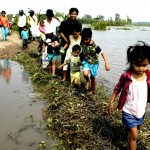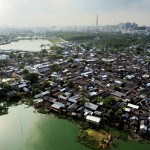 There has been an enormous amount of scholarly work done on the subject of environmental migrants.
There has been an enormous amount of scholarly work done on the subject of environmental migrants.
Most researchers that agree that there is a difficulty in isolating environmental reasons as the sole cause for migration because economic, political, social and cultural factors must also be considered before an individual decides to migrate. Academic research points to the fact that the line between economic migrant and environmental migrant can be quite blurry, except for in the cases of extreme natural catastrophes which identify the environment as the reason to move.
They use the same kind of frames : they do not think that we have to amend the Geneva Convention and they do not use the term “refugee” because it is difficult to prove that the environment is persecuting you.
- Alice Baillat, a PhD candidate focusing on environmental migration in Bangladesh remarks on the little protection afforded to environmental migrants. “there is an important legal gap to protect environmental migrants, there is currently no international regional or specific national legislation that covers them. They are not covered by the Geneva Convention. It is important to establish bridges, on an international level, between environmental law, humanitarian law, refugee law and human rights law to protect migrants.”
 The various research on environmental migration often focuses on two different approaches, adaptation approach with an emphasis on the ability for people to remain in place or a survival solution with emphasis on the ability for people to migrate.
The various research on environmental migration often focuses on two different approaches, adaptation approach with an emphasis on the ability for people to remain in place or a survival solution with emphasis on the ability for people to migrate.
- Olivia Dun, PhD Candidate focusing on the Mekong Delta, Vietnam.
“My preferred approach would be an adaptation approach that provides people with options including both a choice to remain in place and a choice ego migrate should they choose to do so. I think people should be assisted to have a choice about their future”
